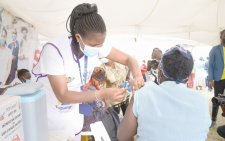A new study on the vaccines that were used to immunise against Covid-19 has concluded that the doses were generally safe, and Kenyans should not listen to misinformation peddled around them.
This helps to end the misconceptions and myths that have surrounded the vaccines.
The government lifted all the mandatory Covid-19 restrictions in March 2022, but ever since there have been numerous myths and misconceptions around the jabs. A lot of those falsehoods about the outcomes of vaccination were, and are still peddled today. They included; infertility, population control, unsafe for pregnant women, and impotence among some of them.
However, results from the nine-month study conducted between February and November 2023 reveals that in total, only 32 in a small population of 100 people in a certain site who were vaccinated reported Adverse Events Following Immunization (AEFIs), or side effects. Investigators with the Pharmacy and Poisons Board (PPB) yesterday termed this mild or moderate, and don’t have to cause worry.
“Generally, the results show that the vaccines were well-tolerated, meaning that they were temporary and resolved within 48 hours of vaccine administration,” said Dr. Bramuel Tongola, a regulatory officer at the PPB.
He said that the most commonly reported AEFIs were headache, injection site pain, general malaise, fever, dizziness, and cough.
Other study partners included the National Vaccines and Immunization Program (NVIP), and the Centre for International Health Education and Biosecurity (CIHEB-Kenya).
While releasing findings of the first ever study on Covid-19 vaccines since the country was declared Coronavirus-free, Dr Tongola also revealed that the pattern of AIFIs reported was consistent with what has been observed globally in the World Health Organisation (WHO) global database, VigiBase.
Pfizer vaccines
“Age, vaccine type, chronic illness, concomitant medication, and prevaccination events were possible predictors of experiencing AEFIs,” he pointed out.
In the study, the investigators focused more on the Johnson and Johnson, and Pfizer vaccines, explaining that they were the only ones that were in circulation during the study period.
“We are pleased to report that no new signals were detected when the COVID-19 safety data from five countries – Kenya, Ghana, Nigeria, South Africa, and Ethiopia – were pooled and analysed under the AU3S Joint Signal Management Group, further confirming the safety of the vaccines,” he said.
Kenya is a member of the African Union Development Agency (AUDA-NEPAD) African Union-Smart Safety Surveillance Program.
Covid antigens
The study sought to identify the incidents, types, severity and predictors of AEFIs after vaccination with Covid-19 antigens. The study according to Dr Tongola found out that, yes these events do occur, and the rate at which they occur is that for every 100, there are 32 people reporting adverse events, that are mild in nature, and also depend on the antigen they receive.
“We want Kenyans to know that we have systems in place, systems that ensure that products that are authorised for use in the country remain to be safe, effective and of good quality,” he said, noting, the study is an output of those systems.
“So there are systems and the medicines and products in circulation are safe, effective and of quality,” he added.
Dr Martha Mandale, a principal investigator in the study, noted that the findings confirm that the benefits of the vaccines far outweigh the risks, providing a crucial tool in the fight against COVID-19 clinical area, where history taking is done, then the examination.
She said it’s a fact in the public domain that vaccines are a key intervention for containing the spread of diseases during pandemics and epidemics, and to curb the spread of the disease, COVID-19 vaccines were developed and granted Emergency Use Authorization (EUA).
“Despite the expedited evaluation and emergency licensure of vaccines, their safety and efficacy should not be compromised, which informed the study’s conduct – Vaccine safety monitoring,” she said.
About 17 sites – a mix of public, private and faith-based organisation and facilities that serve a large population – were selected and the population that was included was representative for 15 counties, and others from neighbouring counties.
The study targeted slightly over 30, 000 participants, but investigators were satisfied with the 9, 288 who participated because they captured a national representation.

















